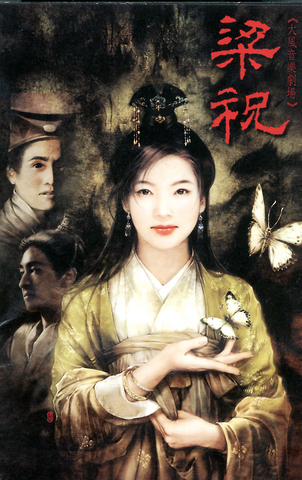The centuries-old Chinese love story of The Butterfly Lovers has been part of folklore for as long as anyone can remember, and has more recently been featured in Chinese traditional operas, on the stage and in movies.
From tomorrow in Taichung, the Dafeng Musical Theater will present this romantic story in a Broadway musical style. The music is composed by the highly-talented Chung Yiu-kwong (
One major and daring change from the original story is the role of Ma Wen-cai (

PHOTO COURTESY OF DAFENG MUSICAL THEATER
The new role that Ma takes in this production is that of a rich, handsome guy who gets almost the same amount of affection from Zhu as Liang does. So, the old story of Zhu breaking away from an arranged marriage turns into a modern triangular love story with leading lady Zhu having to make a final choice of her life-long companion.
Liang is played by Berson Wang (
The Butterfly Lovers is from Oct. 1 to Oct. 2 at Zhongshan Hall, Taichung City; from Oct. 7 to Oct. 8, at Municipal Culture Center, Tainan City; Nov. 4 to Nov. 6, Sun Yat-sen Memorial Hall, Taipei; Nov. 26, Hall of Art, Jungli.
Website: www.liang-zhu.com
Telephone: (02) 2925 3960

The primaries for this year’s nine-in-one local elections in November began early in this election cycle, starting last autumn. The local press has been full of tales of intrigue, betrayal, infighting and drama going back to the summer of 2024. This is not widely covered in the English-language press, and the nine-in-one elections are not well understood. The nine-in-one elections refer to the nine levels of local governments that go to the ballot, from the neighborhood and village borough chief level on up to the city mayor and county commissioner level. The main focus is on the 22 special municipality

The People’s Republic of China (PRC) invaded Vietnam in 1979, following a year of increasingly tense relations between the two states. Beijing viewed Vietnam’s close relations with Soviet Russia as a threat. One of the pretexts it used was the alleged mistreatment of the ethnic Chinese in Vietnam. Tension between the ethnic Chinese and governments in Vietnam had been ongoing for decades. The French used to play off the Vietnamese against the Chinese as a divide-and-rule strategy. The Saigon government in 1956 compelled all Vietnam-born Chinese to adopt Vietnamese citizenship. It also banned them from 11 trades they had previously

In the 2010s, the Communist Party of China (CCP) began cracking down on Christian churches. Media reports said at the time that various versions of Protestant Christianity were likely the fastest growing religions in the People’s Republic of China (PRC). The crackdown was part of a campaign that in turn was part of a larger movement to bring religion under party control. For the Protestant churches, “the government’s aim has been to force all churches into the state-controlled organization,” according to a 2023 article in Christianity Today. That piece was centered on Wang Yi (王怡), the fiery, charismatic pastor of the

Hsu Pu-liao (許不了) never lived to see the premiere of his most successful film, The Clown and the Swan (小丑與天鵝, 1985). The movie, which starred Hsu, the “Taiwanese Charlie Chaplin,” outgrossed Jackie Chan’s Heart of Dragon (龍的心), earning NT$9.2 million at the local box office. Forty years after its premiere, the film has become the Taiwan Film and Audiovisual Institute’s (TFAI) 100th restoration. “It is the only one of Hsu’s films whose original negative survived,” says director Kevin Chu (朱延平), one of Taiwan’s most commercially successful